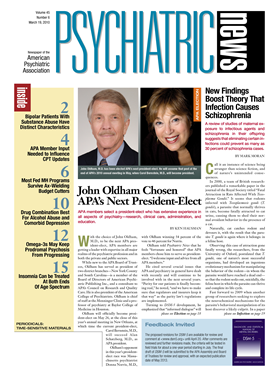Co-occurring substance use disorders (SUDs) are extremely common in patients with bipolar disorder, and research has led some scientists to question whether there is a subtype of bipolar patients who are more prone to substance use comorbidities.
A recent study, published in the March American Journal of Psychiatry, provided new evidence that patients with bipolar disorder and a history of comorbid SUDs have specific characteristics that differentiate them from bipolar patients without the comorbidity.
The data in this study were derived from the Systematic Treatment Enhancement Program for Bipolar Disorder (STEP-BD), the largest study on treatment of bipolar disorder. The study was funded by the National Institute of Mental Health. From 1999 to 2005, clinicians at 19 sites across the United States were trained on the use of treatment guidelines for bipolar disorder, and these clinicians then treated more than 4,000 patients with bipolar disorder. Clinicians were allowed to prescribe any treatment they felt appropriate, and patients were prospectively followed to document outcomes.
In this study, data on 2,154 patients in STEP-BD who had a diagnosis of bipolar I or bipolar II disorder and experienced a new-onset depressive episode were analyzed.
About 44 percent of these patients had alcohol use disorder either currently or in the past, and 30 percent had a past or current drug use disorder. The researchers, led by Michael Ostacher, M.D., M.P.H., of Massachusetts General Hospital and Harvard Medical School, found that patients with comorbid SUDs were more likely to switch from a depressive episode directly to a manic, hypomanic, or mixed episode without experiencing recovery, compared with patients with no comorbid SUDs.
Interestingly, the likelihood of switching did not differ significantly between patients with past SUDs and those with current SUDs. In other words, the risk of direct switch in these patients was not induced or exacerbated by ongoing substance use.
Rapid cycling, defined as at least four mood episodes in the previous year, was more likely in patients with past or current alcohol use disorders, but had no significant correlation with past or current drug use disorders.
Another unexpected finding was that patients' time to recover from a major depressive episode was not affected by whether patients had comorbid SUDs. Neither current nor past substance use appeared to delay the recovery from a depressive episode. In other words, patients with SUDs did not suffer longer depressive episodes than patients without SUDs.
Based on these findings, the authors suggested that patients with concomitant bipolar disorder and SUDs may have a set of inherent characteristics different from those of patients with bipolar disorder and no substance abuse. Their depressive episodes may be more unstable and more prone to switching to mania, but these depressive episodes are not more persistent.
Based on the study findings, the authors concluded that “treatment for bipolar depression should not be with-held from patients with co-occurring alcohol or drug use disorders.” Clinicians can expect bipolar patients with current or past alcohol or drug use disorders to recover as well as patients without such comorbidities.
